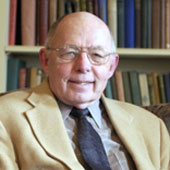A Protestant View of Globalization (Part I)
What prevents many Christians from developing a theological perspective on today’s globalized world?
April 2, 2010
First, there is the prevailing trend among a number of prominent economists who hold that they have a virtual monopoly on understanding globalization. Indeed, believing that every field of human endeavor is explainable in economic terms, they have developed a new sub-discipline that interprets all human motivations and relations, including family life and religion, in terms of a cost-benefit analysis.
I have no doubt that individual interests influence our decision-making. But this new hyper-economic school of thought in effect treats religion as a subjective preference that functions by market forces and can best be understood as a consumer commodity.
It completely disregards the fact that religion is a basis for an ethic that could generate, sustain, guide or reform any political, economic or social policy or any institutional formation.
Second, I am worried about interpretations of biblical and theological themes with regard to the anti-globalization stance of major ecumenical voices. In my view, they have absolutized certain modes of liberationist thought and condemned contemporary globalization as imperialistic and neo-colonial.
In their view, globalization is a totally immoral capitalist phenomenon, ideologically supported by the “Washington Consensus,” designed so that the rich nations can increase their exploitation of the poor. This analysis is highly reductionist, based on a baptism of Marxist class analysis and its philosophy of history.
I think it is both a substantive theological mistake and an inaccurate social account that, if adopted, would have devastating consequences for the world’s poor, whose advocate the ecumenical voices pretend to be.
Third, we still suffer from the fallout of the confused perspective which guided U.S. foreign policy during the Bush years, when its overall conduct was identified with the Christian faith by many of its supporters.
Insofar as these policies were indeed perceived to be Christian, Christianity is likely to be discredited — when it could have been of great help.
At least some of the conduct of the war in Iraq seemed both to have subverted democracy and human rights and to have evoked responses that discredit the principles on which they are based.
If a democratic regime succeeds there, it will be a long, slow and costly miracle, for the moral and spiritual infrastructure that makes democracy and human rights possible has not been built.
What these three influential dimensions share is a failure to grasp the way in which religion — and, in this case, the Christian faith in its Protestant forms — has shaped the developments that generated globalization. It did so by constraining and reforming the powers — the principalities, authorities, thrones and dominions of social life — in directions other than those found in static and authoritarian societies.
These powers, fueled by religious assumptions that are seldom articulated, are in some ways already driving globalization and could reshape it in more creative ways.
At the same time, the evidence suggests that those lands and peoples which most energetically resist globalization — and blame it for the ills that beset them — are likely to become those who are most left behind by it.
Many of the problems they have are homegrown and legitimated by indigenous religious values that limit their capacity to face and cope with the new realities of history.
I say this with full awareness of how impolitic it is to suggest that someone else’s faith or faith-based culture may be inadequate to the tests of the age.
But I do not agree that religion is, can be or should be a purely personal matter — and therefore an intellectually, culturally and socially neutral and impotent force in historical life.
I believe that the kind of faith one has makes a great deal of difference in social, cultural, political and economic life — indeed, to the basic contours of civilization.
In my view, the Christian faith is the most valid faith available to humanity — but I recognize that there are other views that we must encounter in a globalizing world, and we must acknowledge that there are aspects of their insights that can enrich our own.
Faith in the broader sense may be essentially theistic or more humanist or naturalist, and it generally organizes itself into a creed, a code and a cult (in the sense of liturgical forms or rituals) that together form a religion.
I think the evidence is clear that where a religion becomes widely shared, it shapes the identity of a particular group and generates a sense of mission or calling, which in turn fosters one kind, in contrast to other kinds, of public policies.
By this definition, world views such as a philosophical-ethical Confucianism, or an atheistic Buddhism, a secular-humanist liberalism or a radical Marxism, if used to interpret and guide the formation of an ethos, can properly be seen as “religions.” They seek to shape an ethos, even if they are opposed to theistic traditions or do not recognize themselves as religious.
At the same time, to me the evidence is clear that the societies that Protestant Christianity forms are more open to a pluralism that can more easily accommodate these alternative views than societies based in them can, although we must admit that it has not always done so.
Editor’s Note: Part II of this feature will be published on The Globalist on Monday.
Takeaways
I do not agree that religion is, can be or should be a purely personal matter — and therefore an intellectually, culturally and socially neutral and impotent force in historical life.
What these three influential dimensions share is a failure to grasp the way in which religion shaped the developments that generated globalization.
This hyper-economic school of thought completely disregards the fact that religion is a basis for an ethic that could generate, sustain, guide or reform any political, economic or social policy or any institutional formation.
Read previous
America’s Budding 1995 Nostalgia
March 30, 2010
